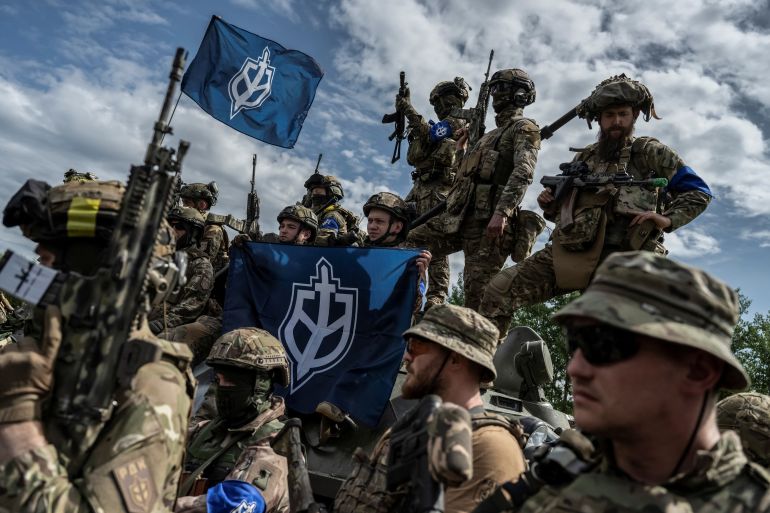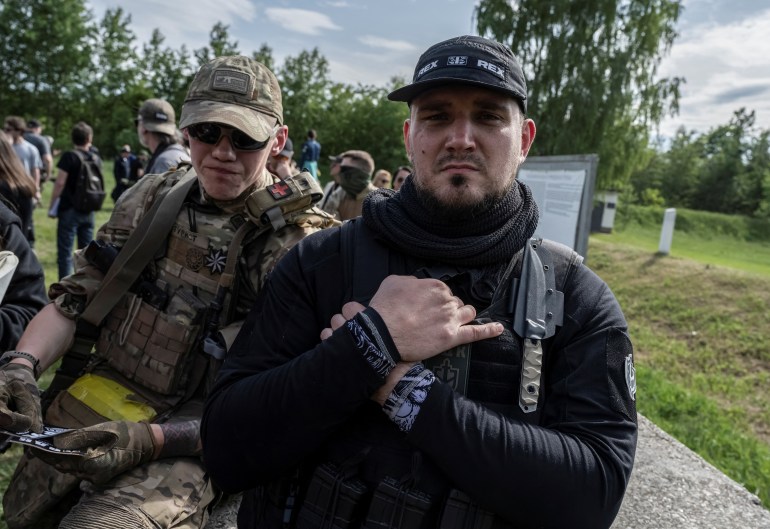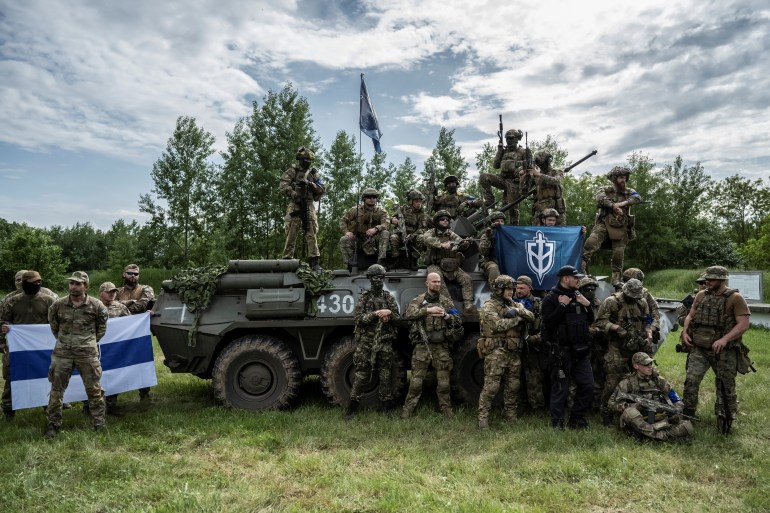Leader of anti-Putin force says expect more Russian border raids
Denis Kapustin, self-described commander of the Russian Volunteer Corps, said his unit will raid Russian territory again.

The Russian commander of fighters that conducted a raid on a Russian border region this week said his group would soon launch more incursions into Russian territory from Ukraine.
Denis Kapustin, who described himself as the commander of the Russian Volunteer Corps (RVC), spoke to reporters on Wednesday on the Ukrainian side of the border with Russia a day after Moscow said it had repelled an attack on Russia’s Belgorod region that lasted almost 24 hours.
Keep reading
list of 4 itemsAttacks in Russia’s Belgorod: What we know so far
Russia claims 70 attackers killed in cross-border Belgorod raid
Brazen raids into Russia aim to stretch forces thin: Analysts
“I think you will see us again on that side,” said Kapustin, who is known as an extreme right-wing Russian nationalist who introduced himself to reporters by his call-sign White Rex.
“The operation is ongoing,” the Moscow-born Kapustin said, flanked by some 30 fighters in camouflage.
“Every operation that takes place on the territory of Russia forces the military leadership to move a large amount of forces precisely to that quadrant, therefore laying bare some parts of the front, parts of the border,” he said.
“Our future plans are new territories of the Russian Federation, which we will definitely enter… You should be just a little bit patient and wait just a couple of days.”

Two armed groups operating in Ukraine – Kapustin’s RVC and the allied Freedom of Russia Legion – claimed responsibility for the incursion on Monday and Tuesday.
Kyiv said it was not involved in the attack, indicating that it was carried out by Russian anti-Putin forces against the Russian military.
Kapustin described his mission as a fight against “injustice” and “torture” under Russian President Vladimir Putin that was aimed at spurring other Russians to act.
“I want to prove to them [Russians] that you can fight against tyrants and that Putin’s power is not boundless,” he said.
Ukrainian authorities “did encourage us” but did not provide weapons or equipment or instructions for this mission, Kapustin added.
Belgorod regional Governor Vyacheslav Gladkov reported that two women died and at least 12 people were wounded in the cross-border attack.
Local Russian media also reported on Thursday that an estimated 500 houses were damaged in the attack, including 200 that were destroyed. Residents who had fled their homes in Belgorod have not yet returned in some areas, according to the media reports, as authorities are working to identify and make safe mines that were left on the streets and in buildings in the region’s Grayvoron district.
The Russian military said that it routed the raiders with artillery and air attacks that killed more than 70 of what it described as “Ukrainian nationalists” on a sabotage mission designed to deflect attention from Russia’s gains in the bombed-out city of Bakhmut.
Kapustin said the total losses on his side were two killed and 10 wounded.
“And, of course, the Ukrainian military took our wounded. But anything more than this would make things difficult,” he said referring to Ukrainian involvement in his operations.
“Every decision we make … beyond the state border is our own decision. Obviously, we can ask our [Ukrainian] comrades, friends for their assistance in planning,” he said.
Described by the United States-based Anti-Defamation League as “a Russian neo-Nazi”, Kapustin’s audacious cross-border raid has embarrassed the Kremlin but also raises questions about the involvement of far-right Russian nationalists in Ukraine and how this might affect Western allies’ readiness to supply Kyiv with weapons.
Kapustin admitted his group was right-wing. He was also asked if he minded being labelled a Nazi.
“I have my set of views, it’s a patriotic set of views, it’s a traditionalist set of views, it’s a right-wing set of views. You know, you’ll never find me waving a flag with a swastika, you’ll never find me raising my hand in a Hitler sign. So why would you call me that?”
Asked repeatedly about media reports that his fighters had used US military equipment in the raid on Russian territory – equipment provided to allow Ukraine to defend itself against Russia’s invasion – Kapustin declined to answer directly.
“I know exactly where I got my weapons from. Unfortunately, not from the Western partners,” he said. He suggested that Western military equipment had been captured by Russia in the battle for Bakhmut and that such equipment could be bought on the black market.
“I think I explained that the Western military aid unfortunately goes back and forth, being raided. In Bakhmut, for instance, I know that a lot of armoured vehicles, American armoured vehicles, got raided by the Russian forces,” he said.
US officials said on Wednesday that they were looking into reports that US vehicles were used inside Russian territory.
The Kremlin said the use of US military hardware in the cross-border attack proved the West’s growing involvement in the war.

“It is no secret that this equipment is being used against our own military. And it is no secret for us that the direct and indirect involvement of Western countries in this conflict is growing by the day. We are drawing the appropriate conclusions,” Kremlin spokesperson Dmitry Peskov told reporters.
Russian Defence Minister Sergei Shoigu promised on Wednesday that Moscow would respond to any more cross-border raids “extremely harshly”.